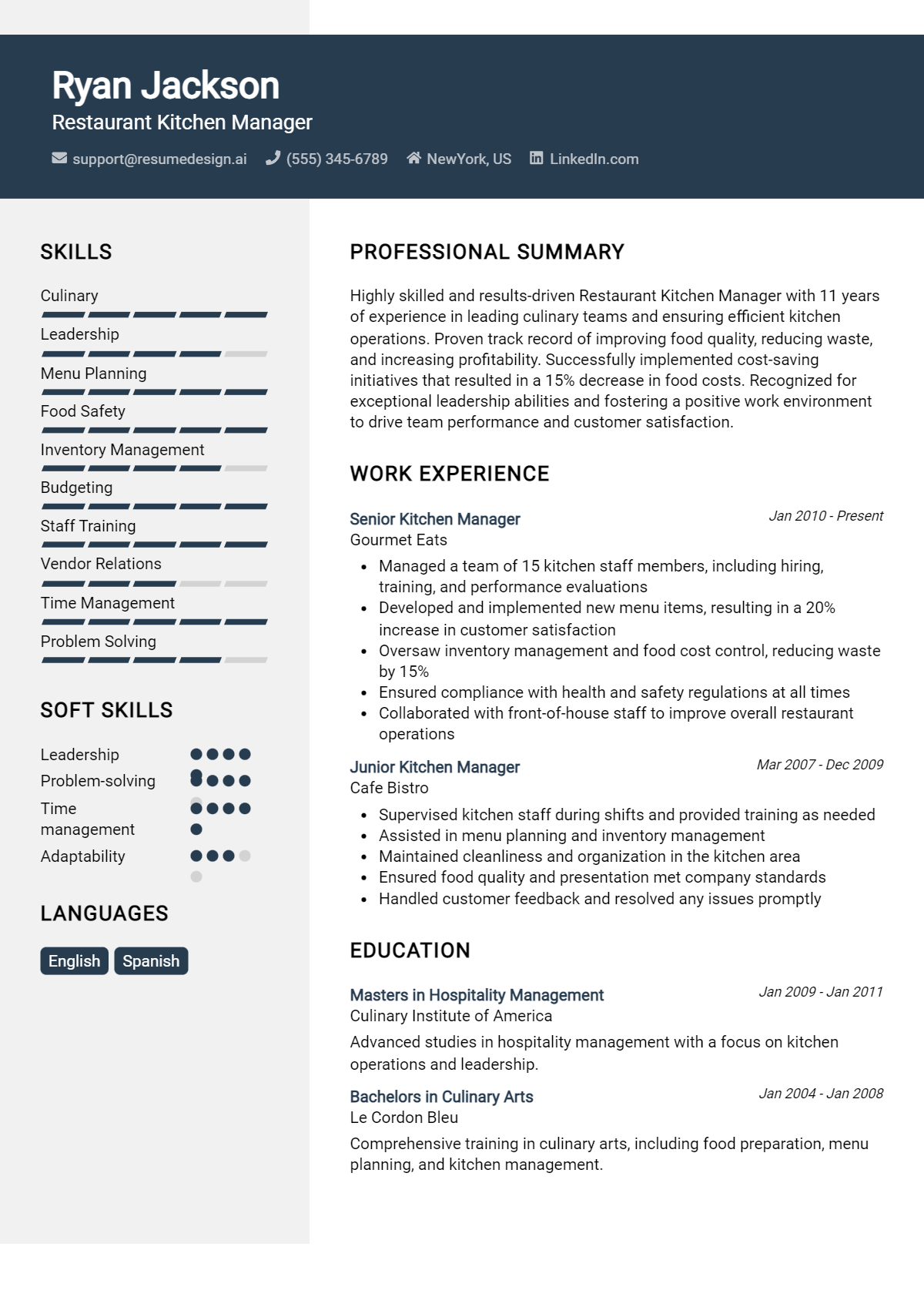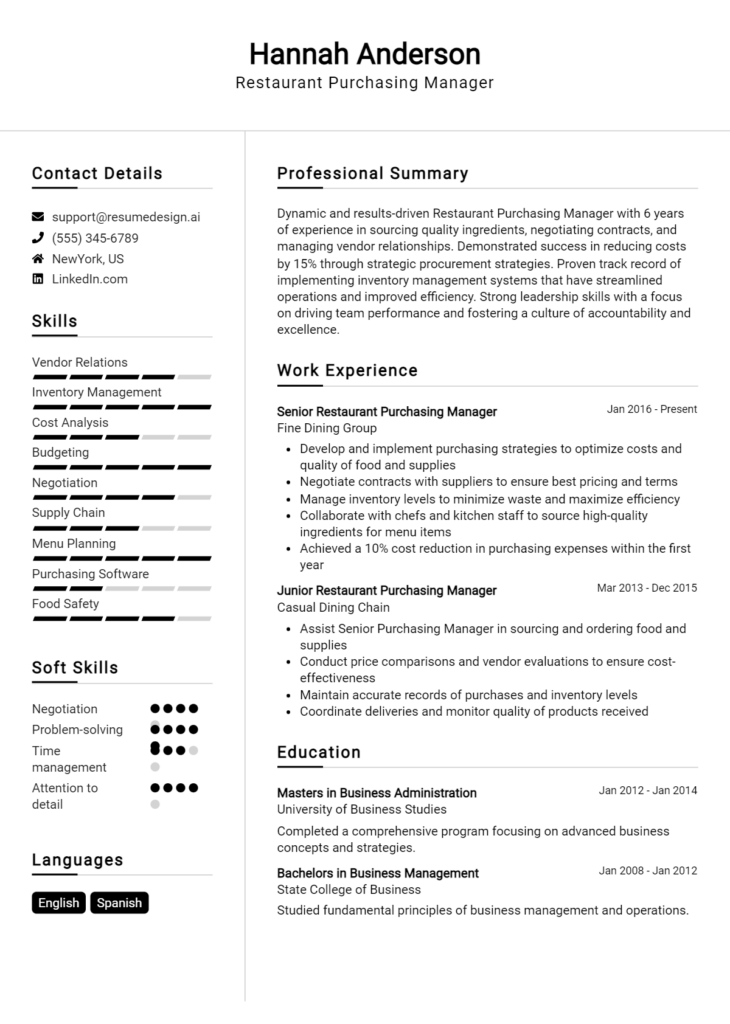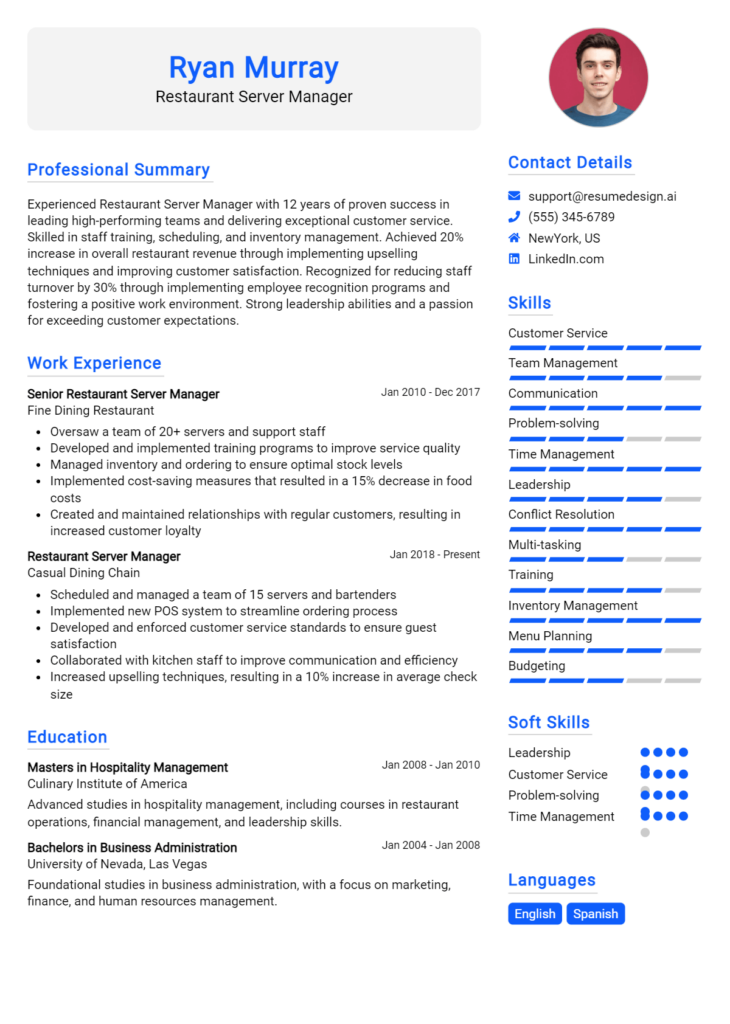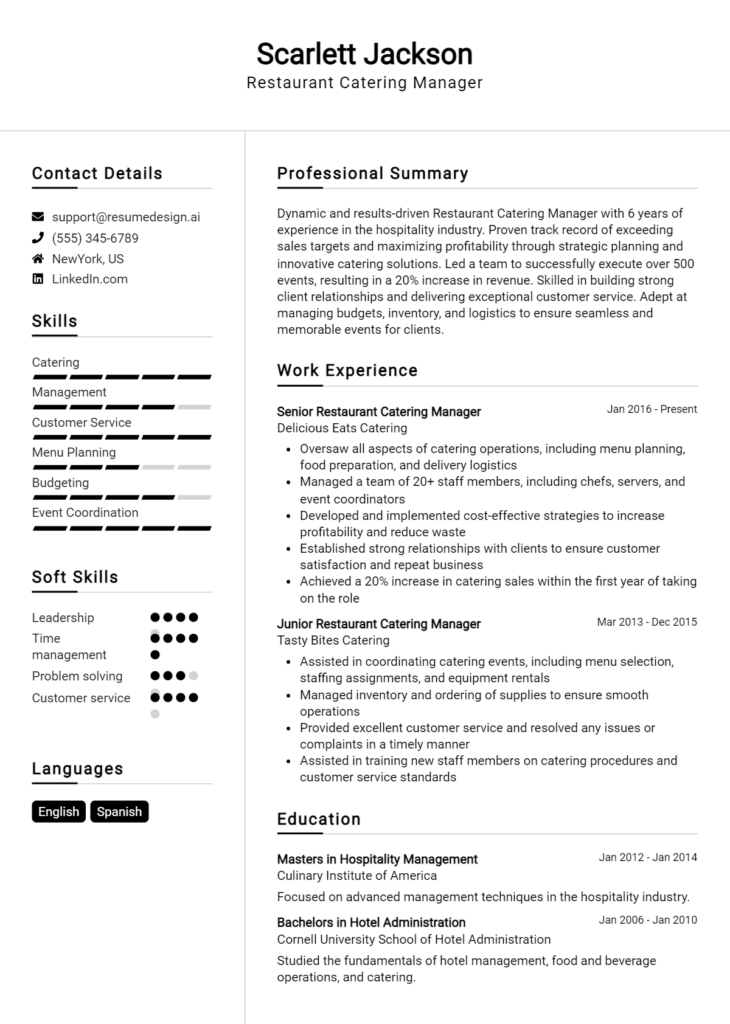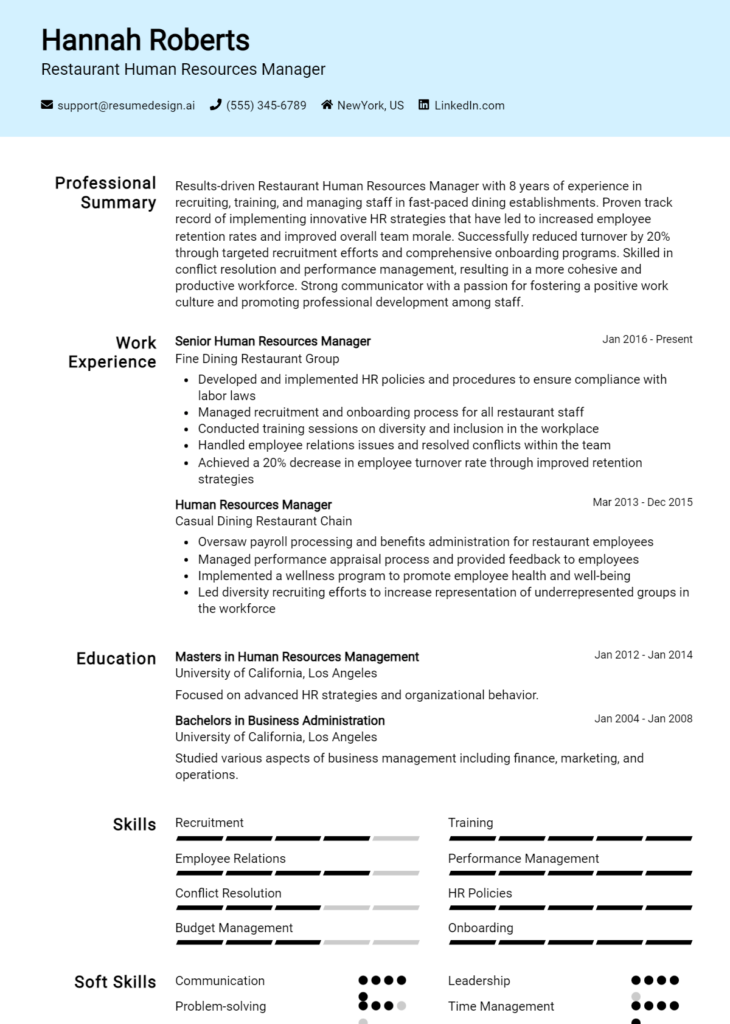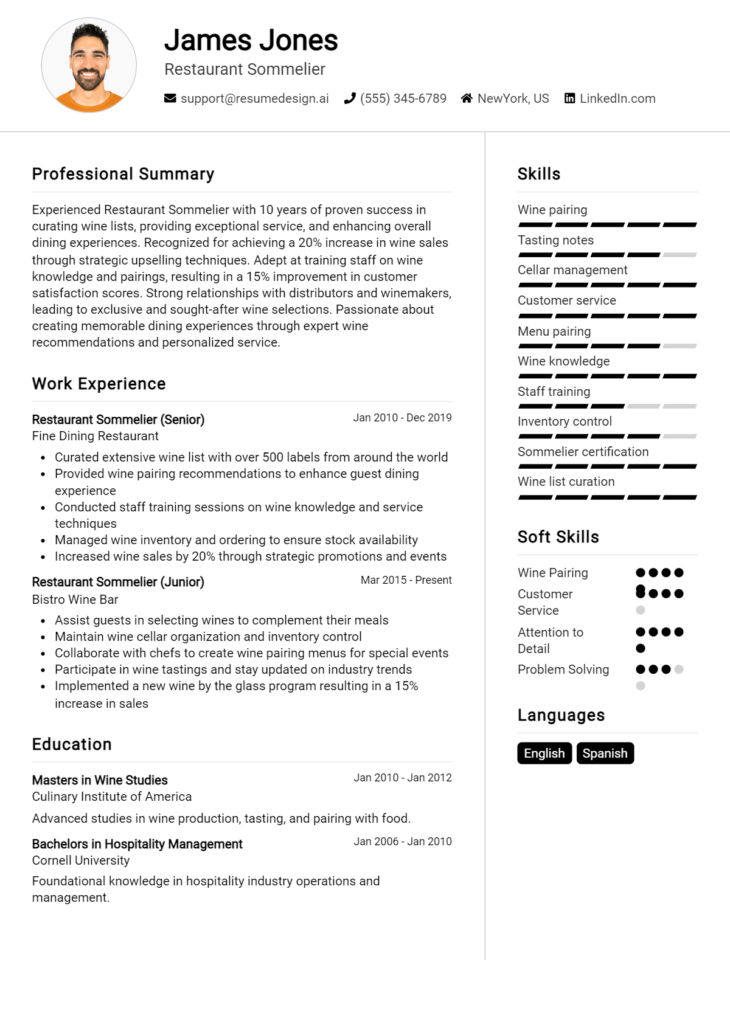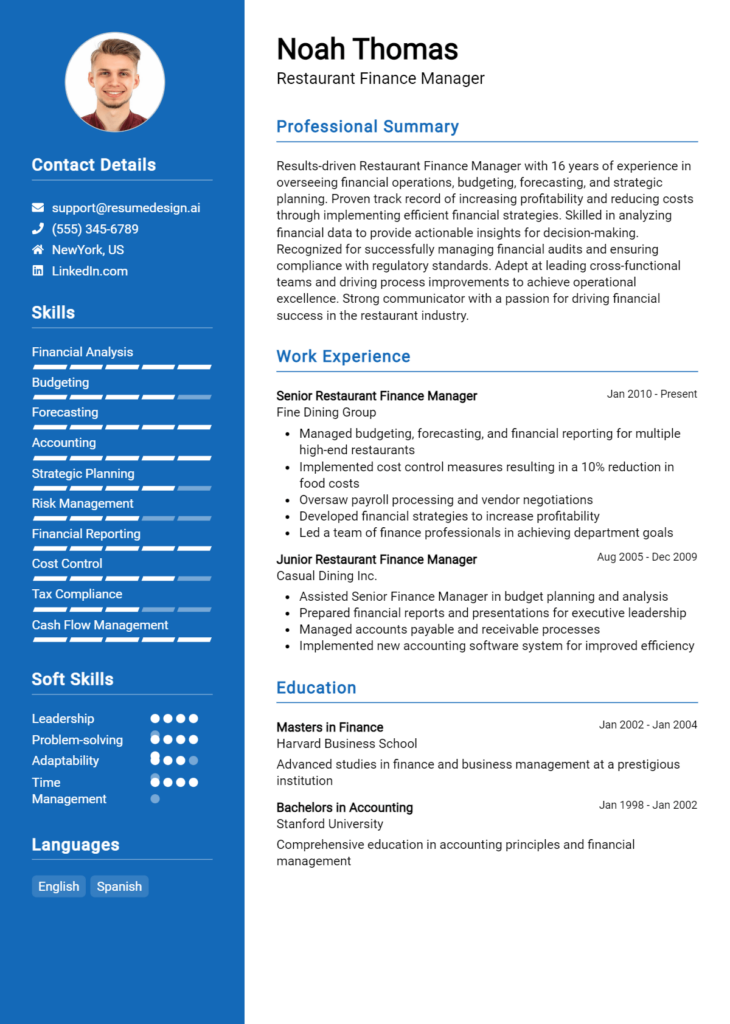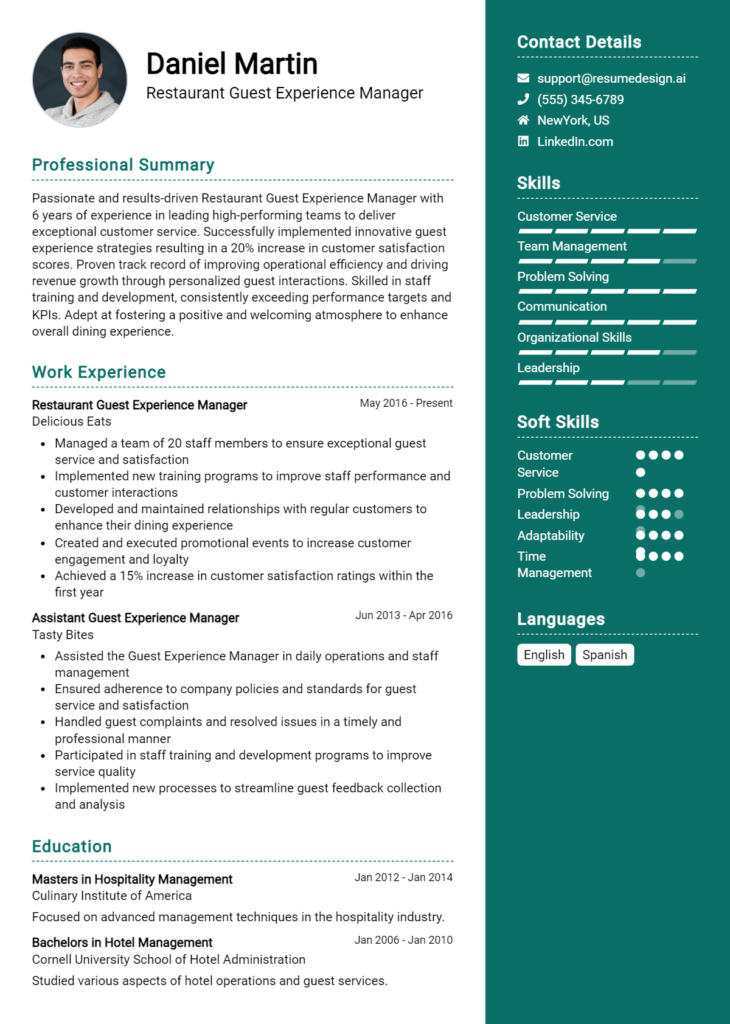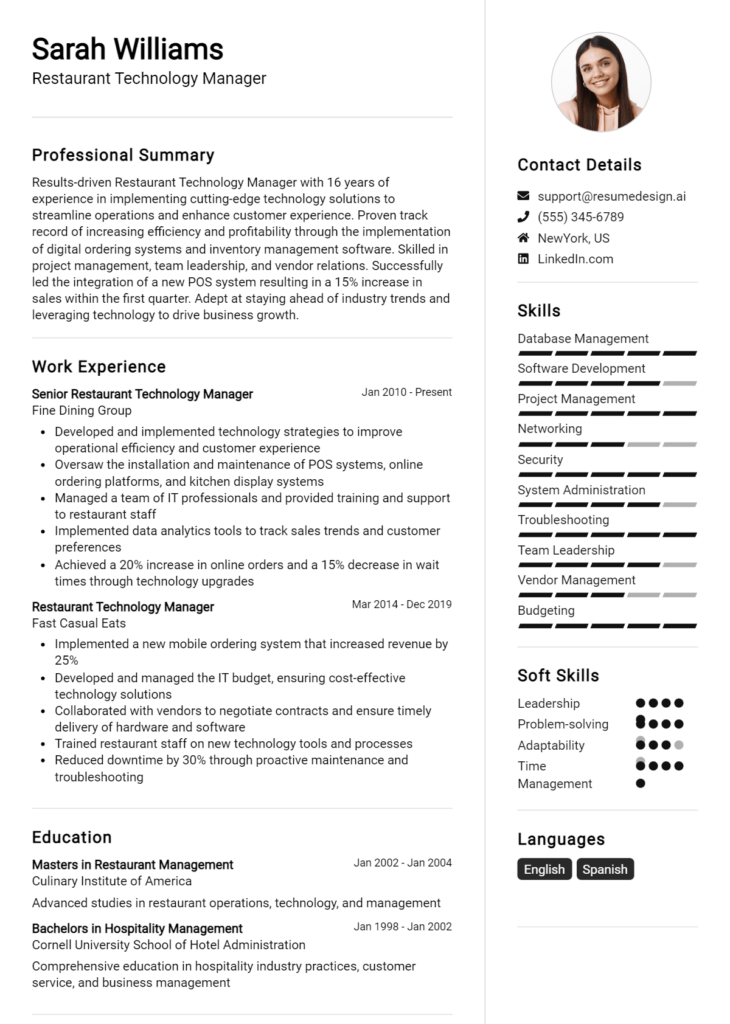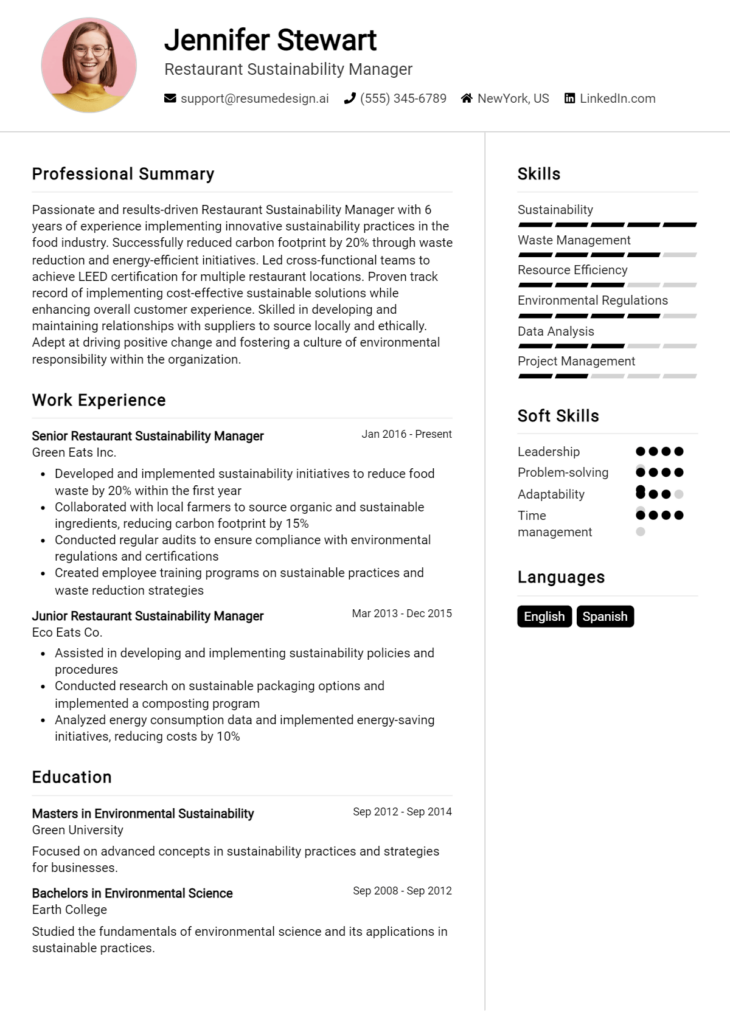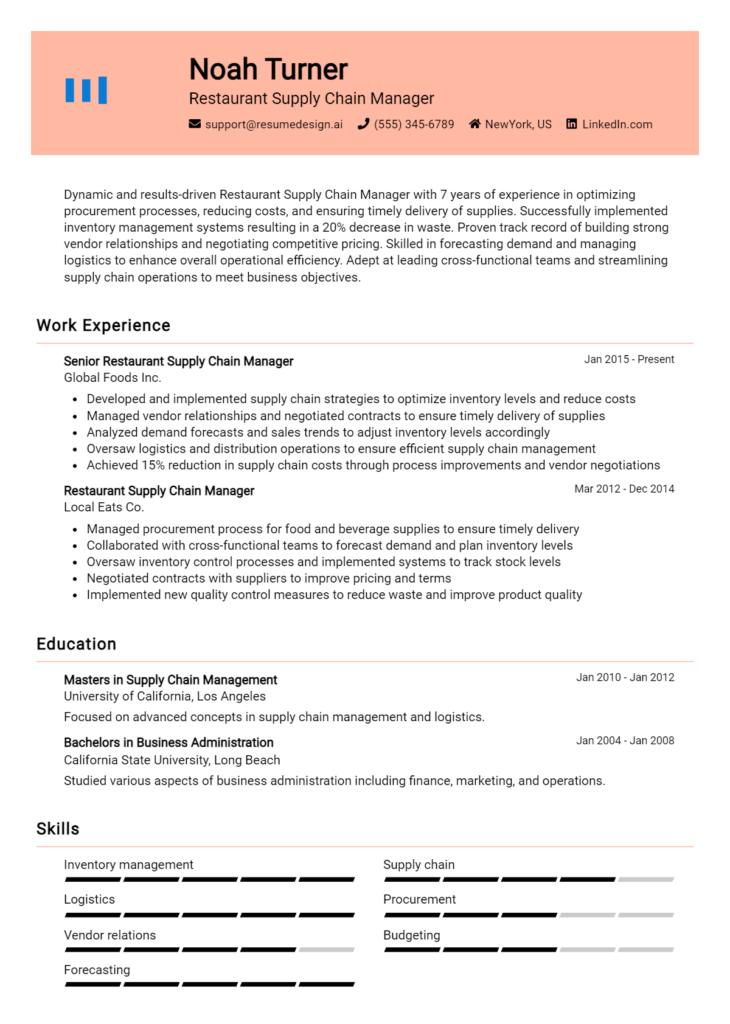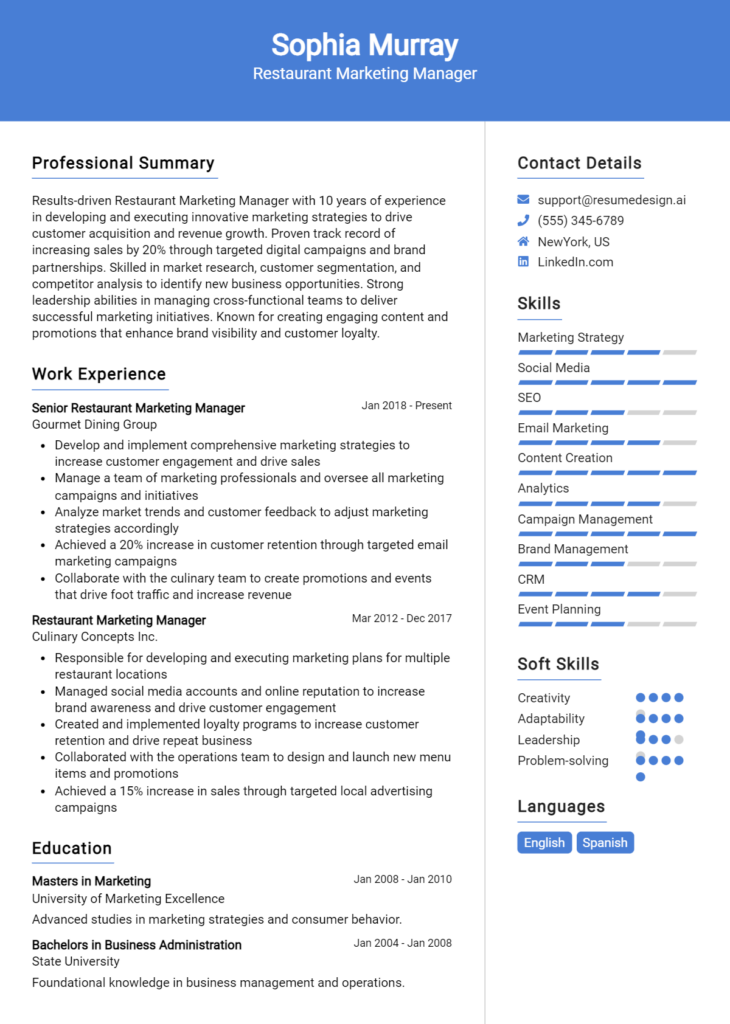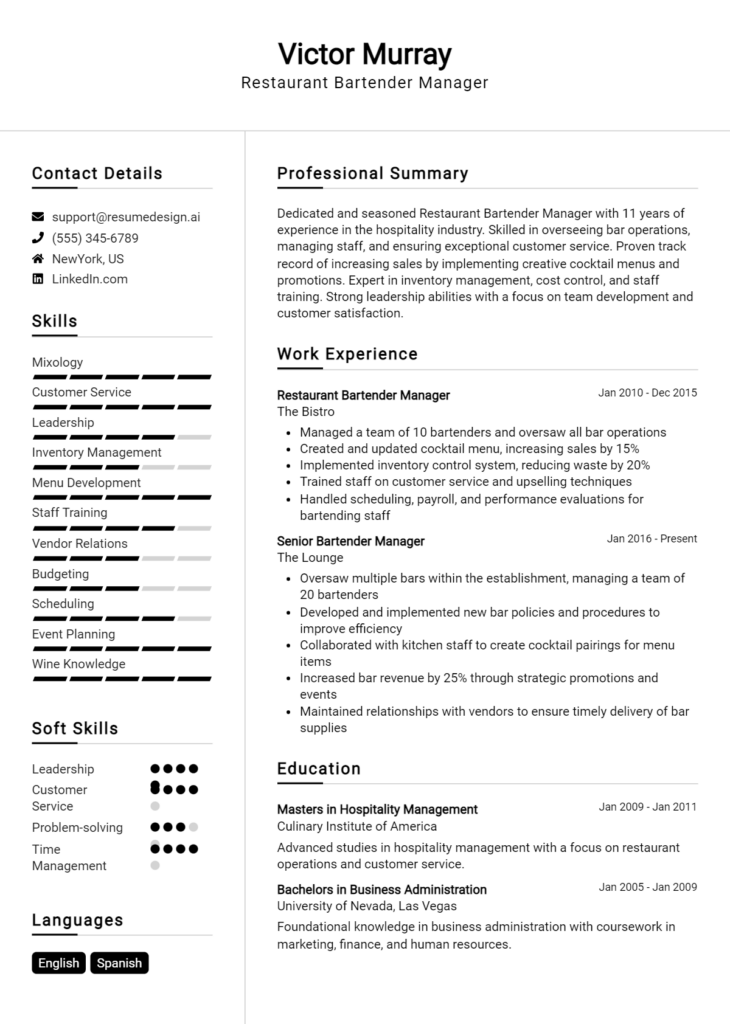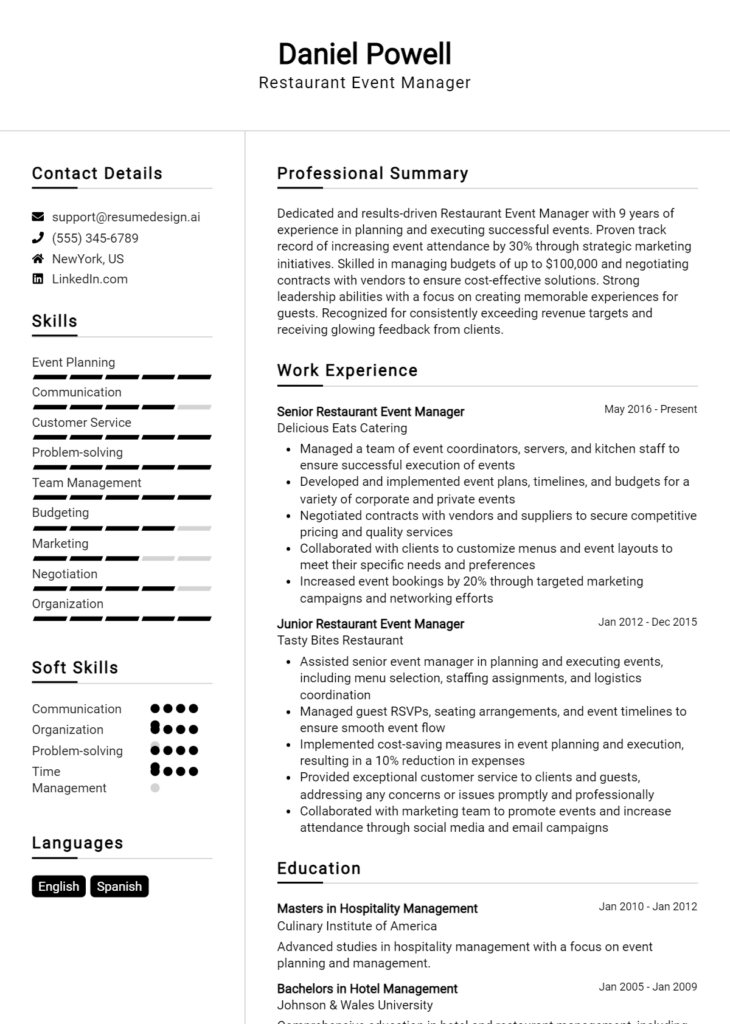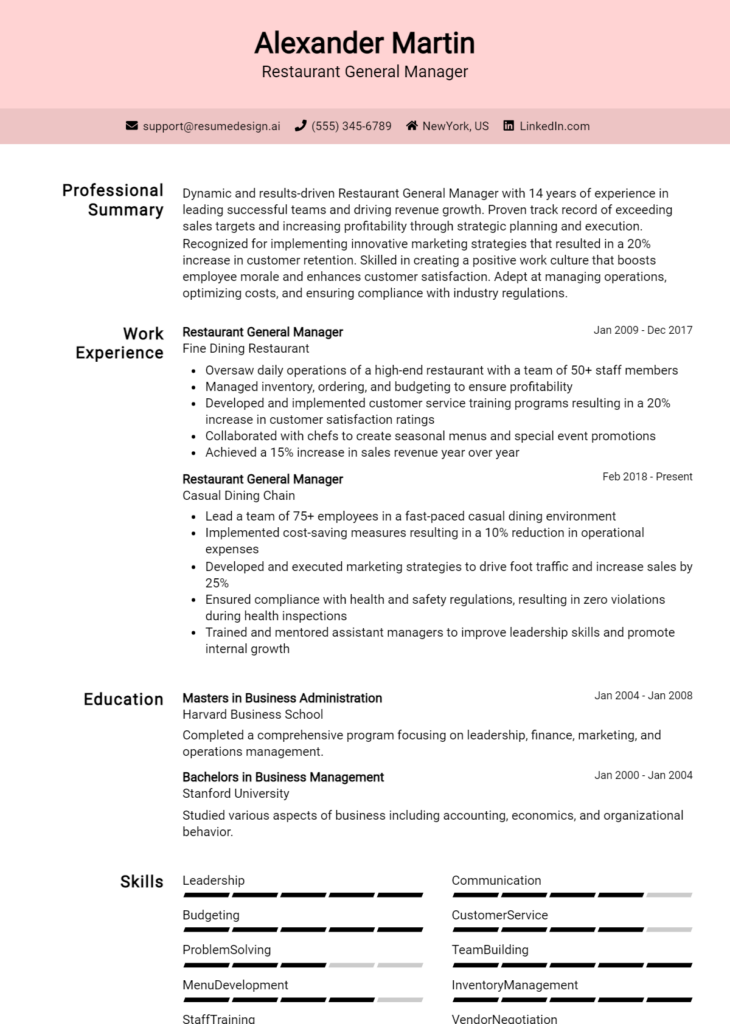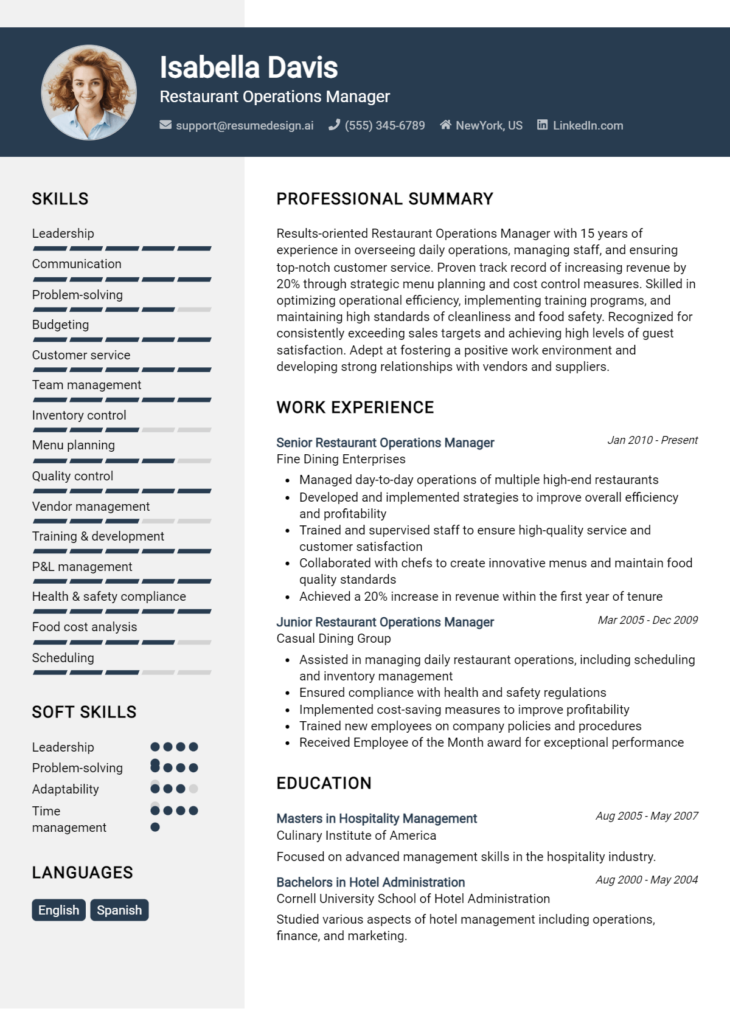Restaurant Kitchen Manager Core Responsibilities
The Restaurant Kitchen Manager plays a crucial role in overseeing kitchen operations, ensuring quality food preparation, and maintaining health and safety standards. They bridge communication between kitchen staff and front-of-house teams, requiring strong technical skills in cooking, inventory management, and staff training. Problem-solving abilities are essential for addressing operational challenges and optimizing workflow. A well-structured resume that highlights these competencies can significantly enhance job prospects, aligning personal skills with the organization's goals for success.
Common Responsibilities Listed on Restaurant Kitchen Manager Resume
- Oversee daily kitchen operations and staff management.
- Ensure compliance with health and safety regulations.
- Develop and implement menu items and recipes.
- Manage inventory, including ordering and supplier relationships.
- Train and mentor kitchen staff to enhance performance.
- Monitor food quality and presentation standards.
- Control food costs and oversee budgeting processes.
- Coordinate with front-of-house staff for smooth service.
- Address and resolve customer complaints related to food.
- Conduct regular kitchen inspections for cleanliness and efficiency.
- Implement and maintain operational procedures and standards.
- Assist in hiring and onboarding new kitchen personnel.
High-Level Resume Tips for Restaurant Kitchen Manager Professionals
In the competitive culinary world, a well-crafted resume is essential for Restaurant Kitchen Manager professionals who aspire to stand out in a crowded job market. Your resume often serves as the first impression you make on potential employers, and it's crucial that it effectively showcases your skills, experiences, and achievements in the kitchen. A strong resume not only highlights your culinary expertise but also reflects your leadership capabilities and operational success. This guide will provide practical and actionable resume tips specifically tailored for Restaurant Kitchen Manager professionals, helping you to create a document that captures the attention of hiring managers and sets the stage for a successful career.
Top Resume Tips for Restaurant Kitchen Manager Professionals
- Tailor your resume to each job description, emphasizing the skills and experiences that align with the specific requirements of the position.
- Highlight your relevant experience in kitchen management, including past roles, responsibilities, and the types of cuisines you have worked with.
- Quantify your achievements, such as cost savings, efficiency improvements, or increased customer satisfaction ratings, to demonstrate your impact in previous roles.
- Showcase your leadership and team management skills, providing examples of how you have successfully led kitchen staff and fostered a positive work environment.
- Include industry-specific skills such as inventory management, food safety standards, and menu development to demonstrate your expertise.
- Utilize action verbs in your descriptions to convey a sense of initiative and effectiveness in your work.
- Incorporate relevant certifications such as ServSafe, culinary school diplomas, or management training programs to enhance your qualifications.
- Keep your formatting clean and professional, using clear headings and bullet points to improve readability and organization.
- Consider including a summary statement that encapsulates your career goals and what you bring to the table as a Kitchen Manager.
By implementing these tips, you can significantly increase your chances of landing a job in the Restaurant Kitchen Manager field. A focused and polished resume will not only highlight your qualifications but also demonstrate your commitment to excellence in kitchen management, making you a compelling candidate for potential employers.
Why Resume Headlines & Titles are Important for Restaurant Kitchen Manager
In the competitive landscape of the restaurant industry, a Restaurant Kitchen Manager plays a vital role in ensuring culinary excellence and operational efficiency. Crafting a compelling resume headline is crucial for candidates in this position, as it serves as the first impression for hiring managers. A strong headline or title can instantly grab attention and encapsulate a candidate's key qualifications in a single impactful phrase. By being concise, relevant, and directly related to the job being applied for, an effective resume headline sets the tone for the entire application, highlighting the candidate's unique value proposition and encouraging further review of their qualifications.
Best Practices for Crafting Resume Headlines for Restaurant Kitchen Manager
- Keep it concise: Aim for a headline that is short and to the point, ideally no more than 10-12 words.
- Make it role-specific: Tailor the headline to reflect the specific position of Restaurant Kitchen Manager.
- Highlight key skills: Include the most relevant skills or areas of expertise that align with the job description.
- Use industry-relevant keywords: Incorporate terms that are commonly recognized in the culinary field.
- Showcase accomplishments: Consider including a quantifiable achievement to demonstrate your impact in previous roles.
- Avoid jargon: Use clear language that is easily understood by all readers, avoiding overly technical terms.
- Be authentic: Ensure that the headline genuinely reflects your experience and what you bring to the table.
- Test different versions: Experiment with variations to see which resonates best or aligns with different job applications.
Example Resume Headlines for Restaurant Kitchen Manager
Strong Resume Headlines
Dynamic Kitchen Manager with 10+ Years of Culinary Leadership and Staff Development
Results-Driven Restaurant Kitchen Manager Specializing in Menu Innovation and Cost Control
Award-Winning Kitchen Manager with Expertise in High-Volume Operations and Team Building
Weak Resume Headlines
Kitchen Manager Seeking Job
Experienced Worker in a Restaurant
The strong headlines are effective because they clearly convey the candidate’s key strengths and qualifications, making it easy for hiring managers to quickly understand their value. By focusing on specific skills and accomplishments, these headlines stand out in a sea of applications. In contrast, the weak headlines fail to impress due to their vagueness and lack of specificity, which does not provide any meaningful insight into the candidate's capabilities or suitability for the role. A compelling headline should serve as a powerful introduction that invites further exploration of the candidate's resume.
Writing an Exceptional Restaurant Kitchen Manager Resume Summary
In the competitive landscape of the restaurant industry, a well-crafted resume summary is crucial for a Restaurant Kitchen Manager. This brief yet powerful section serves as the first impression for hiring managers, quickly capturing their attention by highlighting key skills, relevant experience, and notable accomplishments. A strong summary should be concise, impactful, and tailored specifically to the job the candidate is applying for, ensuring that it resonates with the employer's needs and sets the tone for the rest of the resume.
Best Practices for Writing a Restaurant Kitchen Manager Resume Summary
- Quantify Achievements: Use numbers to demonstrate your impact, such as improved food cost percentages or increased team efficiency.
- Focus on Relevant Skills: Highlight key skills that align with the job description, such as inventory management, staff training, and food safety compliance.
- Tailor for the Job Description: Customize your summary to reflect the specific requirements and keywords mentioned in the job posting.
- Showcase Leadership Qualities: Emphasize your ability to lead, motivate, and manage kitchen staff effectively.
- Include Industry Experience: Mention years of experience and types of cuisines or establishments you have worked in.
- Highlight Accomplishments: Bring attention to any awards, certifications, or recognitions received during your career.
- Maintain a Professional Tone: Use strong, professional language that conveys confidence and competence in your abilities.
- Keep It Concise: Aim for 3-5 sentences that provide a snapshot of your qualifications without overwhelming the reader.
Example Restaurant Kitchen Manager Resume Summaries
Strong Resume Summaries
Results-driven Kitchen Manager with over 8 years of experience in high-volume restaurants, successfully reducing food costs by 20% while improving quality standards. Proven track record in staff training and development, leading a team of 15 to achieve a 95% customer satisfaction rating.
Dynamic culinary professional with a passion for menu innovation and seasonal ingredient sourcing. Led a kitchen renovation project that increased kitchen efficiency by 30%, resulting in a 25% boost in overall sales within six months.
Experienced Kitchen Manager specializing in Italian cuisine, with a focus on authentic recipes and flavor profiles. Recognized for implementing efficient inventory systems that decreased waste by 15% and enhanced profitability.
Weak Resume Summaries
Kitchen Manager with several years of experience looking for a new opportunity. Skilled in various kitchen tasks and managing staff.
Dedicated professional with a background in food service and kitchen management. Seeking to contribute to a restaurant's success.
The examples provided illustrate the distinction between strong and weak resume summaries. Strong summaries are specific, quantifiable, and tailored to the role, showcasing the candidate's achievements and relevant skills. In contrast, weak summaries are vague and generic, lacking the details that would capture a hiring manager's interest or demonstrate the candidate's fit for the position.
Education and Certifications Section for Restaurant Kitchen Manager Resume
The education and certifications section is a crucial component of a Restaurant Kitchen Manager resume, as it underscores the candidate's academic background, industry-relevant certifications, and commitment to continuous learning. This section not only provides potential employers with insights into the candidate's qualifications but also demonstrates their dedication to professional development and staying updated with industry standards. Including relevant coursework, certifications, and specialized training can significantly enhance a candidate's credibility and show alignment with the specific demands of the job role, setting them apart from other applicants.
Best Practices for Restaurant Kitchen Manager Education and Certifications
- Focus on relevant degrees such as Culinary Arts, Hospitality Management, or Food Science.
- Include industry-recognized certifications, such as ServSafe or HACCP certification.
- Highlight specialized training in areas like menu development, food safety, and kitchen management.
- Provide details about relevant coursework that aligns with the skills needed for a kitchen manager position.
- Keep the section organized and easy to read, using bullet points for clarity.
- Update the section regularly to reflect new certifications or courses completed.
- Use specific names for certifications, avoiding abbreviations that may not be universally recognized.
- Consider including any relevant awards or recognitions received during educational pursuits.
Example Education and Certifications for Restaurant Kitchen Manager
Strong Examples
- Bachelor of Science in Culinary Arts, Johnson & Wales University
- ServSafe Food Protection Manager Certification, National Restaurant Association
- HACCP Certification, International HACCP Alliance
- Advanced Culinary Techniques, Le Cordon Bleu
Weak Examples
- High School Diploma
- Certificate in Basic Cooking Skills, Local Community Center
- First Aid Certification (not food-related)
- Outdated Food Safety Certification from 2010
The strong examples listed above are considered effective because they showcase relevant degrees and certifications that are highly regarded in the culinary industry, reflecting a candidate's preparedness for the role of a Kitchen Manager. In contrast, the weak examples lack direct relevance to the position, featuring outdated or general qualifications that do not demonstrate the candidate's specialized knowledge or commitment to the culinary profession. This distinction in examples highlights the importance of aligning educational credentials with industry expectations and job requirements.
Top Skills & Keywords for Restaurant Kitchen Manager Resume
As a Restaurant Kitchen Manager, possessing the right skills is crucial for success in a fast-paced and demanding environment. A well-crafted resume that highlights both hard and soft skills can set you apart from other candidates, showcasing your ability to lead a team, maintain high culinary standards, and ensure smooth kitchen operations. Skills not only reflect your professional capabilities but also your adaptability and problem-solving prowess, essential traits in the culinary world. By focusing on the skills that matter most, you can present a compelling case to potential employers about your qualifications and readiness for the role.
Top Hard & Soft Skills for Restaurant Kitchen Manager
Soft Skills
- Leadership
- Communication
- Teamwork
- Problem-solving
- Time management
- Adaptability
- Conflict resolution
- Customer service orientation
- Attention to detail
- Stress management
- Creativity
- Decision-making
- Work ethic
- Motivation
Hard Skills
- Food safety and sanitation
- Menu development
- Inventory management
- Cost control
- Culinary techniques
- Staff training and development
- Equipment maintenance
- Recipe standardization
- Nutritional knowledge
- Vendor management
- Ordering and purchasing
- Kitchen layout optimization
- Quality assurance
- Food presentation
- Compliance with health regulations
- Scheduling and labor management
By emphasizing these skills in your resume, along with relevant work experience, you can effectively demonstrate your qualifications for the position of Restaurant Kitchen Manager.
Stand Out with a Winning Restaurant Kitchen Manager Cover Letter
Dear [Hiring Manager's Name],
I am excited to apply for the Restaurant Kitchen Manager position at [Restaurant Name], as advertised on [where you found the job listing]. With over [X years] of culinary experience and a proven track record in kitchen management, I am confident in my ability to lead your kitchen team to success while maintaining the high standards your restaurant is known for. My passion for creating exceptional dining experiences, combined with my strong organizational skills, allows me to effectively manage kitchen operations and ensure food quality and safety.
Throughout my career, I have honed my culinary skills and developed a comprehensive understanding of kitchen management. In my previous role at [Previous Restaurant Name], I successfully managed a team of [X] chefs and kitchen staff, overseeing daily operations, menu planning, and inventory management. I implemented cost-saving measures that reduced food waste by [X%] while enhancing the overall quality of our dishes. My hands-on approach and effective communication foster a collaborative environment where creativity and teamwork thrive, ultimately leading to improved staff morale and guest satisfaction.
I am particularly drawn to [Restaurant Name] because of its commitment to [specific value or mission of the restaurant, such as sustainability, innovation, etc.]. I believe my experience in implementing seasonal menus and sourcing local ingredients aligns with your restaurant's ethos. I am eager to bring my expertise in kitchen management and my passion for culinary excellence to your team, ensuring that every dish served meets the highest standards of taste and presentation.
Thank you for considering my application. I look forward to the opportunity to discuss how my background and skills can contribute to the continued success of [Restaurant Name]. I am excited about the possibility of working together to create memorable dining experiences for your guests.
Sincerely,
[Your Name]
[Your Contact Information]
[LinkedIn Profile or Website, if applicable]
Common Mistakes to Avoid in a Restaurant Kitchen Manager Resume
When crafting a resume for the role of a Restaurant Kitchen Manager, it's essential to present your skills and experiences effectively. However, many candidates make common mistakes that can hinder their chances of landing an interview. Avoiding these pitfalls can significantly enhance your resume and make it stand out to potential employers.
Vague Job Descriptions: Failing to provide specific details about your previous roles can leave employers unsure of your capabilities. Clearly outline your responsibilities and achievements in past positions.
Neglecting Quantifiable Achievements: Omitting measurable outcomes, such as cost savings or improvements in kitchen efficiency, can weaken your resume. Use numbers to demonstrate your impact.
Using Generic Language: Resorting to clichés or generic phrases can make your resume blend in with others. Tailor your language to reflect the unique aspects of your experience and the specific job you are applying for.
Ignoring Keywords from the Job Description: Not incorporating relevant keywords from the job posting can result in your resume being overlooked by Applicant Tracking Systems (ATS). Use terms that match the requirements listed by the employer.
Overloading with Irrelevant Information: Including unrelated experience or skills can dilute your qualifications. Focus on what is most pertinent to the kitchen management role.
Poor Formatting and Structure: A cluttered or confusing layout can detract from the content of your resume. Ensure it is well-organized, easy to read, and visually appealing.
Omitting Soft Skills: While hard skills are crucial, neglecting to highlight essential soft skills like leadership and communication can be a mistake. These qualities are vital for a successful kitchen manager.
Failing to Tailor Your Resume for Each Application: Sending out a generic resume for multiple positions can be a significant error. Customize your resume for each job to address the specific needs of the employer and demonstrate your genuine interest.
Conclusion
As a Restaurant Kitchen Manager, your role is pivotal in ensuring the smooth operation of the kitchen, maintaining high standards of food quality, and leading your culinary team effectively. Key responsibilities include overseeing food preparation, managing inventory, ensuring compliance with health regulations, and training staff. Strong leadership, communication, and organizational skills are essential to foster a productive work environment and deliver exceptional dining experiences.
To excel in this role, it's crucial to have a well-crafted resume that highlights your skills, experience, and achievements in kitchen management. An impactful resume can set you apart from other candidates and demonstrate your ability to manage a bustling kitchen efficiently.
Now is the perfect time to review your Restaurant Kitchen Manager resume. Ensure that it accurately reflects your expertise and positions you as the ideal candidate for your next opportunity. Utilize available tools to enhance your application:
- Explore a variety of resume templates to find one that fits your style and profession.
- Use the resume builder to create a polished and professional resume quickly.
- Check out resume examples to gain insights into effective formatting and content.
- Don’t forget to craft a compelling cover letter with our cover letter templates that can complement your resume and further showcase your qualifications.
Take action today and refine your resume to reflect your capabilities and achievements as a Restaurant Kitchen Manager!

